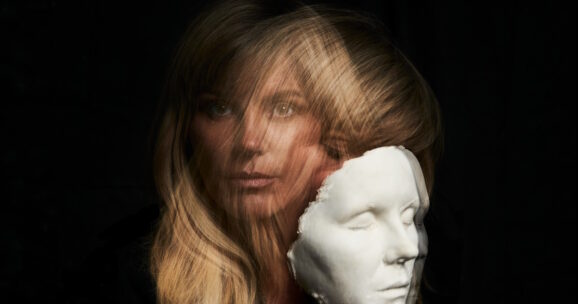Bette Smith grew up in the rough and tumble neighborhood of Brooklyn’s Bedford–Stuyvesant. Her humble beginnings were mitigated somewhat by her father, a church choir director who once had to protect his kids by running out of the house waving a two-by-four. He taught Bette to sing. He also taught her that a career in music outside the church was wrong, and only after he died did Bette passionately pursue music. She didn’t start singing sweet soul music, she began with the rebellious, raucous kind that most would term rock n’ roll. She attracted the attention of the eccentric outsize personality, Jimbo Mathus, from the big band Squirrel Nut Zippers, who wanted to get her out of NYC. So Jimbo invited Bette down to Mississippi and together, they recorded Bette’s debut album, 2017’s Jetlagger, apparently to the mutual satisfaction of all involved because most return to those same environs for The Good The Bad The Bette, her debut on the Ruf label.
This time, Mathus played a more supportive role as a band member, turning the production reins to his frequent collaborators, Drive-By Trucker bassist Matt Patton and engineer/drummer Bronson Tew as producers at Dial Back Sound in Water Valley, MS. These are the same guys that helped Drive-by Truckers’ Patterson Hood produce one of the year’s best, Jerry Joseph’s The Beautiful Madness. And, although Patton was not a DBT member at the time, Bette Smith’s brashness and rebellious persona evokes that famous collaboration between Bettye LaVette and the DBT’s, The Scene of the Crime.
Yet Patton has plenty of his own credentials, having previously helmed projects by Jimbo Mathus and the Dexateens as well as contributing to albums with Dom Flemons, Seratones, and Candi Staton. He played bass on Jetlagger. Smith says, “When I called on my producer Matthew Robert Patton, I told him that I wanted a southern rock soul/Aretha Franklin/’I once was lost but now I’m found’ theme.” He in turn enlisted guests North Mississippi Allstar Luther Dickinson (guitar on “Signs and Wonders”) and fellow DBT member Patterson Hood (vocals on “Everybody Needs Love”) to join him on the new album. Patton says, “We wanted to get heavy into her rock side. Even the ballads on this record hit hard. We were pulling from Ike & Tina, Betty Wright and Betty Davis, stuff like that.”
Smith also became deeply autobiographical, revealing a childhood trauma. The album is about relationships, sequenced to tell her story, from a present-day portrait of the strong, health-obsessed woman she is to a flashback of her trauma and the emotional void she tried to fill with the party life, before receiving a sign and finding healing. Bette explains, “The album message is a story seen through the lens of a child, and then an adult, who still wears her scars of childhood—but also of hope, strength and optimism going forward in life. Often people think I’m very confident and strong, but they don’t know I’ve faced many obstacles and traumas I fought hard to overcome.”
The album kicks off with the organ-driven, wailing guitar workout, the anthem-like “Fistful of Dollars’ before Smith says a final goodbye to her mother in the ballad “Whistle Stop,” the emotional touchstone on the album. It’s based on a dream that she had right before her mother died. Bette recalls, “I was on the platform and she was at the last car on the train and she was waving me goodbye and the way I analyzed the dream was that she didn’t say goodbye to me when she abandoned me the first time but she did say goodbye the second time. I’m telling her, ‘come spend some time with me,’ because she haunts me. It’s unrequited love.”
Mathus helps propel the reverb-filled “I’m a Sinner,” “I Felt It Too” gets wild and Luther Dickinson’s guitar imbues “Signs and Wonders,” a tune that brings it down to a soulful simmer. Her dog offered her care and affection, filling the void left by her parents as outlined in the rocking “(I Wanna Be Your) Human.” According to Patton, the turning point for the record came early when the theme developed. He says, “At that point it became pretty heavy. With the emotional heft, there was the fatigue of travel, times of sickness and the time constraints under which we worked. This made those wow moments that she’s so capable of vocally super dramatic. Bette was delivering during the moments we absolutely needed.”
“Song for a Friend” takes a more conventional soul path while “Pine Belt Blues” brings back the edgy, aggressive approach. “Everybody Needs Love” has Patterson Hood contributing vocals and the tune has heavy overtones of The Beatles’ “All You Need Is Love.” The closer is a scintillating ballad, likely offered up as a stern warning, given Bette’s childhood, “Don’ t Skip Out on Me.”
Bette Smith’s story is one of redemption. From a childhood of trauma and sadness, she is finding joy in singing and performing. She says. “It’s very spiritual and I go into a trance when I’m singing. The fans are like family. I feel very loved. They are very present. I went through all of this so I could sing and now that I can sing, I’m finding the love that I’ve been looking for all my life. It feels like a homecoming. There’s an instant feeling of family reunion. They talk to me like they met their little sister. It’s the same love in New York, Nashville, or Spain. When I sing these songs, it’s a connection of inner children. I’m singing to their inner child.”
Bette Smith is the epitome of “music is a healing force.” Maybe some of it will rub off on you too.











